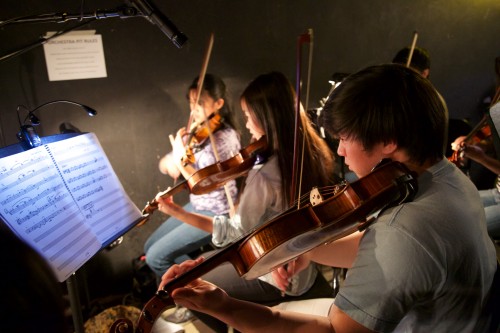
By CHELSEA GUO
Contributing Writer
Upon watching The Pajama Game, you’ll notice the actors’ charismatic flair as they sing their hearts out on stage. You’ll notice the carefully choreographed dance numbers and you might even catch the beautiful costuming and set design. But something you might not consider is the music behind the musical.
A dark winding staircase outside the theater leads to the instrumental pit, a tiny room right below the stage. The music played here is the foundation of each song and sound effect that the audience hears but cannot see. Because of this visual barrier, the students that dedicate hours to making the musical great are usually unacknowledged for their hard work.
Starting in December, the pit has been holding three-hour rehearsals three times a week. Rehearsal time has recently jumped to six hours every weekday, meaning pit members have been staying at school until later than 9 PM.
“You have to learn the songs really fast,” said Tuongvi Bui (Fr.), a violinist. “I just learned how to manage my time better.”
Despite the huge degree of commitment, musicians of all grades have voluntarily decided to give up their own time to make this year’s musical the best it can be.
“It’s just the nature of doing this. It’s very time consuming but when you’re done with it, it’s very rewarding. In the midst of it you kind of feel like it’s mass chaos everywhere, but we’re creating so many memories,” said Ms. Grace Lee (Visual and Performing Arts Dept.), the pit conductor and musical director.
The Pajama Game’s 1950s jazz style and the high standard to which pit musicians are held make for a challenging change of pace from everyday classes.
“We have to listen for vocal cues, instrumental cues and cues from the directors, so I think [being in pit] has made me more musically aware,” said trumpetist Sonia Kelly (So.).
During rehearsals, the pit and the cast must work together to perfect the synchronization of every song and sound effect. Both parties must work together to ensure that the scenes flow smoothly.
“The [idea] that you’re playing for actors gives so much more meaning to the songs because you know that other people are depending on you to play,” said David Li (Sr.), who plays clarinet and tenor saxophone.
“It’s taught me how to stay together more,” said violinist Raina Zhao (So.). “In the pit we really have to listen to each other and watch the conductor, so I’ve been doing a lot more of that.”
Perhaps the two most significant takeaways the instrumental pit creates are new friendships and a deeper appreciation for music and musicals. All of its musicians have bonded over their common progress and gained firsthand experience of working behind-the-scenes in a musical, and many will choose to continue participating in pit orchestra.
“I went to the musical freshman year, it was Shrek, and I didn’t really think much of the amount of time and effort that went towards the production,” said Nelson Lo (Jr.), a cellist. “Now that I’m doing pit, it’s really cool to see how it’s all coming together, like the tech people, singers and musicians coming doing everything together.”
People of all talents put their best effort into The Pajama Game, working together to create a fantastic end product that can be enjoyed by all.
“I hope that from this experience, my musicians will gain an appreciation for multiple art forms, so not just instrumental music, but all of the performing arts, dance, vocal music, set design and everything that goes into it,” said Lee.
Categories:
Perfect Pit: the music behind the musical
March 2, 2016

Pit orchestra musicians invest countless hours in perfecting musical accompaniment for The Pajama Game. (A. Novakovic)
0
Tags:
Donate to Sword & Shield
$180
$1000
Contributed
Our Goal
Your donation will support the student journalists of University High School. Your contribution will allow us to purchase equipment and cover our annual website hosting costs.
More to Discover













